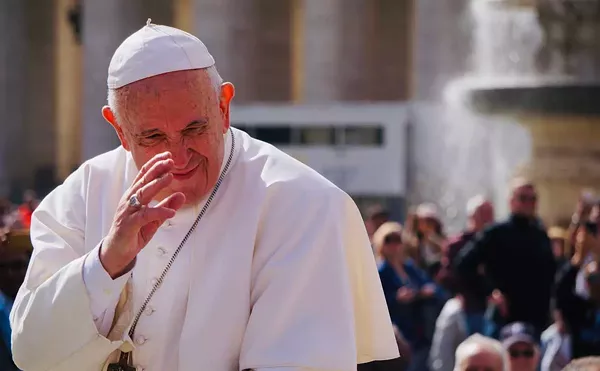
Audio By Carbonatix
[
{
"name": "GPT - Leaderboard - Inline - Content",
"component": "35519556",
"insertPoint": "5th",
"startingPoint": "3",
"requiredCountToDisplay": "3",
"maxInsertions": 100,
"adList": [
{
"adPreset": "LeaderboardInline"
}
]
}
]
Writer-director Éva Gardos, in basing An American Rhapsody on her own childhood in Hungary and adolescence in 1960s America, wants very much to get personal, to expose the aspects of her life which weren’t openly discussed, those things immigrants are supposed to pack away after they’ve arrived in America but need to remember if they’re going to make sense of their divided existence.
The film opens in Budapest during the 1950s, where book publisher Peter (Tony Goldwyn) and his wife Magrit (Nastassja Kinski) are preparing to flee to the West with their two young daughters. For reasons which aren’t detailed, they are scheduled to be arrested by Communist officials. Peter, Magrit and 4-year-old Maria take a harrowing journey across the countryside and through a barbed-wire border crossing into Switzerland, followed by the big leap to the United States. Meanwhile, things don’t go as smoothly for baby Zsuzsa. Instead of being smuggled out, she’s sent to live on a Hungarian farm with Jeno (Balázs Galkó) and Teri (Zsuzsa Crinkóczi), whom she eventually comes to think of as her real parents, even though she’s told there are mysterious others in America.
Gardos, whose previous work in film has been as an editor, effectively cuts between the anguished Magrit, who begins an unrelenting campaign to get her daughter out of Hungary, and the childless Teri, who sees the buoyant youngster as a blessing. When 6-year-old Zsuzsa is finally reunited with her family in Los Angeles, it’s the most extreme culture shock imaginable, yet Gardos chooses to focus on small details, a technique which gives An American Rhapsody its intimate power.
Great events are often seen by their participants as a series of seemingly insignificant moments, and it’s only when Zsuzsa slowly realizes that she’s expected to become Suzanne, the beloved daughter of these kindly but demanding total strangers, that her fate sinks in.
When that Hungarian child morphs into an openly rebellious American teenager (Scarlett Johansson) who engages in a heated battle for control of her future with an increasingly reactionary Magrit, her family makes a wise but unconventional decision to allow the determined Susie to travel alone to Budapest in order to reconcile her past.
Low-key and novelistic in its approach, An American Rhapsody constructs a potent family portrait through strong, emotionally complex performances. Johansson (Manny and Lo, Ghost World) is particularly effective as a sullen teen who realizes she was the worshiped lost child of two couples.
In the graceful way Zsuzsa-Suzanne tries to unite the parts of her life torn apart by well-intentioned adults, Gardos composes a rhapsody whose tune only she could play.
Opens Friday exclusively at the Maple Art Theatre (4135 W. Maple, W. of Telegraph). Call 248-542-0180.
Serena Donadoni writes about film for Metro Times. E-mail her at letters@metrotimes.com.





